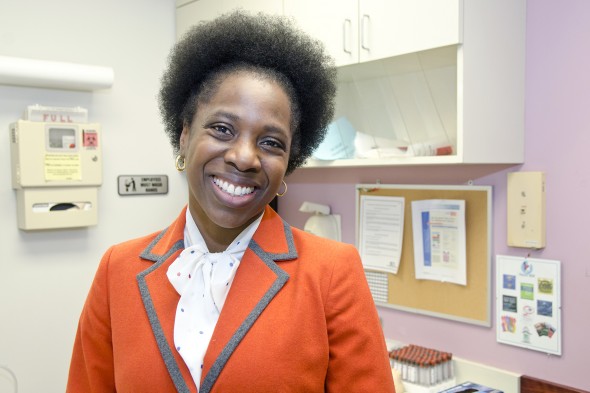Doctor on the front lines of Ebola crisis in Sierra Leone

Olamide Jarrett, assistant professor of medicine, is volunteering in the Ebola Isolation Unit in a hospital in Sierra Leone, where many of her family live. Photo: Joshua Clark/UIC Photo Services
By Olamide Jarrett
Olamide Jarrett, assistant professor of medicine, traveled to Sierra Leone Nov. 15 to assist health care workers treating Ebola patients.
I am a first-generation Sierra Leonean-American. While I was born and raised in the U.S., I am very connected to my family in Sierra Leone and still have several aunts, uncles and cousins who live in Sierra Leone.
Every day the Ebola outbreak continues, my family, who so far are all healthy, are at risk of becoming ill and infected. While I am grateful to everyone from around the world who has volunteered to help in this outbreak, it is important to me that Sierra Leonean and Liberian doctors and nurses from the diaspora are part of the response to help their respective countries. After all, this outbreak is happening in our country, our homeland.
Sometimes it’s not enough to talk about how you want to see your country improve or to talk about all the ways it can be a stronger nation. Eventually, you have to be willing to be on the ground and help out in a time of crisis and need.
I am working on the Ebola Isolation Unit in Connaught Hospital, the main government hospital in Freetown, the capital of Sierra Leone. The purpose of the isolation unit is to screen for any potential Ebola patients that come to the hospital for care. Outside the hospital all patients are screened for symptoms of Ebola or exposure to a recent Ebola patient. If a patient meets the screening criteria, they are admitted to the Ebola Isolation Unit to be tested for Ebola and receive basic medical care while waiting for their results. Patients found to be negative for Ebola are either discharged home, if they feel better, or sent to the hospital emergency room for further evaluation and treatment. Patients found to have Ebola are sent to treatment centers for additional care.
My work in the unit is to help admit and discharge patients to the isolation unit and assist with any patient care needs while they are there, including feeding patients, providing oral rehydration, medication, etc. I also help prepare and remove the bodies of patients who die.
There is still a lot of work that needs to be done to get the Ebola outbreak under control in Sierra Leone. Currently, there are not enough treatment and isolation beds for all the potential Ebola cases that present for evaluation. Fortunately, additional treatment and isolation units are being set up at this time and will hopefully be up and running within the next month.
I am working with King’s Sierra Leone Partnership, a health system strengthening program established by King’s College in London. They have done an amazing job in setting up the Ebola Isolation Unit and there is never a shortage of personal protective equipment for healthcare workers. There is still a need for additional volunteers to help staff the current and newly opening treatment and holding centers.
What has truly struck me from before I arrived until now is the amount of stigma that health care workers are dealing with. It makes me angry and sad to see people stigmatized for doing a great thing by helping to fight this Ebola crisis in the country. I’ve heard multiple stories of local Sierra Leone nurses who are now ostracized by their families because of their work in the isolation unit. And most of the expats who are volunteering have similar stories of family and friends who have uninvited or cancelled events because they are scared to see them for 21 days when they return.
The additional insult in all of this is the implication that health workers who have volunteered to help those in need would knowingly endanger others if they did become symptomatic. Believe me, if any of us gets any symptoms suspicious for Ebola we would seek care right away because quite frankly, none of us wants to die from Ebola.
I am grateful that my colleagues in the College of Medicine’s Section of Infectious Diseases have been supportive of my trip and have assisted me in any way possible.
